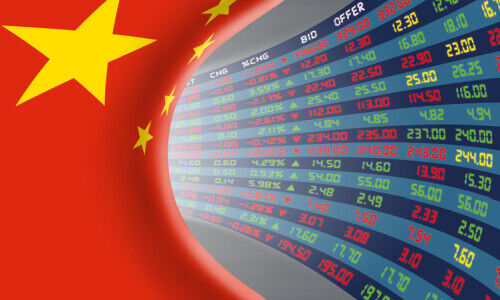US Leaves China’s Financial Markets Out of New Ban
After a period of consultation, passive investments and listed mainland securities are likely to be exempt in order to prevent unintended consequences. finews.asia takes a look.
It has been a choppy week for China’s public markets and economy. As finews.asia previously commented, things got off to a slow start early in the week with sagging trade figures subsequently compounded by the announcement of falling consumer and producer prices, raising the unwelcome albeit still unlikely specter of deflation.
Meanwhile, real estate stalwart Country Garden seems to have joined the growing list of developers - speak Evergrande - who have gone suddenly incommunicado (collated Google search results) when it comes to making coupon payments on its debt, highlighting how the country’s property crisis seem to rumbles, largely unimpeded, for what seems like forever.
Now, on top of everything else, a fresh executive order straight from Joe Biden’s White House. As finews.asia reported early Thursday, the US government intends to ban specific areas of the tech industry in the name of national security, among them «certain» artificial intelligence systems.
Narrowly Targeted
For anyone who was not confused about what the US has banned or not banned in relation to China, the only thing we can say is – you are not alone.
Still, the overnight announcement from the Treasury stresses that the order is «narrowly targeted» and that it is fully cognizant of the importance of cross-border investment flows which have «long contributed» to American economic vitality.
Given that, they appear to be targeting direct investments in the private equity and venture capital space, among others, that potentially help «accelerate the indigenization» of the technologies themselves.
Deliberate Approach
Moreover, the authorities appear intent on minimizing unintended consequences by taking what they call a «deliberate approach» to exempt transactions.
From the looks of it, that means they intend to permit further US investment in publicly traded securities, index funds, mutual funds, ETFs, and intracompany transfers from US parent companies to subsidiaries.
But the truth of it is that much of this is still in the air as the Treasury, which is ultimately responsible for enforcing the executive order, simply put out an advance notice of the proposed rules it intends to create, meaning that members of the public have 45 days to send comments in.
Commerce Ministry Reply
On «Xinhua», a spokesperson for China’s Ministry of Commerce had a ready response, saying that the American imposition of foreign investment limits on its own companies was an «act of decoupling» that was aimed at «severing» industrial and supply chains.
The truth is that it is not yet clear how narrow or broad this new measure will eventually be. In this new era of tit-for-tat sanctions, things rarely seem to turn out to be as effective as governments initially assume.
A decade back, it was widely believed in financial circles, particularly compliance ones, that any bank kicked out of the international SWIFT transaction processing system would quickly become paralyzed and ground to a halt. However, that clearly that didn’t happen when Russian banks were banned from the system last year after the invasion of Ukraine.
Moral Imperative
Even though there appears to be reasonable moral, and economic imperatives behind many of the steps many democratic countries have recently taken against what they consider authoritarian regimes, in practice they don’t seem to up end up being that effective.
The raft of US and EU measures against Russia has not paralyzed that country’s war machine in the way that many initially envisioned. Not to mention that it has been 70 years since the US imposed the first sanctions against North Korea.
The only thing we can say for sure is that China’s equity markets, and investors, have something more to worry about - even if they are not the main targets of the current measure. As finews.asia commented yesterday, geopolitics have likely become the most important factor prompting international investors to be very cautious about investing in China.























